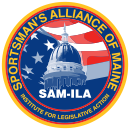Testimony in Support
LD 9, An Act to Prohibit the Creation of a Firearm Owner Registry
LD 350, An Act to Repeal Certain Requirements Concerning the Sale and Purchase of Firearms
Before the Joint Standing Committee on Criminal Justice and Public Safety
Written by David Trahan, Executive Director, Sportsman’s Alliance of Maine
March 17, 2017
Senator Rosen, Representative Warren, distinguished members of the Criminal Justice and Public Safety Committee, my name is David Trahan. I am the Executive Director of the Sportsman’s Alliance of Maine testifying in support of LD 9, An Act to Prohibit the Creation of a Firearm Owner Registry and LD 350, An Act to Repeal Certain Requirements Concerning the Sale and Purchase of Firearms. First, I would like to begin by thanking Rep. Corey for sponsoring these two SAM bills.
Recently, I was asked whether LD 9 was necessary. The answer to that question is ‘yes’. Most people, legislators included, are unaware that a state database of all firearm owners whose firearms were purchased through federally licensed firearm dealers are retained in a de-facto state firearms owner database. To understand why this bill is relevant and one of the reasons it is before you, I ask you to look at another SAM bill, LD 350, An Act to Repeal Certain Requirements Concerning the Sale and Purchase of Firearms on your public hearing schedule later today.
Current state law, Title 15, Chapter 17, subsection 455, establishes a state gun owner database by requiring Federal Firearm License in Maine to make an additional “state copy” of the Alcohol Tobacco Firearms and Explosives form 4473, “see attached” that contains confidential personal information about individuals who purchase firearms. This second “state copy” form 4473 must be stamped “state copy” and kept separately by dealers and produced, without restriction, to law enforcement upon request. There are no protections from potential governmental abuse like those built into the NICS system. In addition, we have reached out to the State Police to inquire why this law is on our books, and to date, have received no good reason.
This “state copy” 4473 process violates the intent of federal laws and rules as it relates to databases and the National Instant Criminal Background Check System. Gun owners readily accept FBI background checks for firearm sales because we know federal law prohibits the establishment of federal databases containing information about law abiding gun owners. In addition, we understand documents like the 4473 are housed, not with the government, but with the licensed FFL dealers and are only accessible by the federal government when there is an active investigation of a specific crime and firearm.
Because copies of the 4473 forms are retained by non-governmental FFL dealers, they act as a reasonable firewall between gun owners and the potential abuses of government. For this reason, we support the repeal of subsection 455 of Title 15 and urge passage of LD 350.
Back to LD 9. Imagine Mainers response if our organization proposed legislation requiring citizens to register their names with the government before they could exercise their first amendment rights of free speech? If you think such a free speech database would act to chill citizen’s rights of free expression, we agree.
The right of law-abiding citizens to legally own firearms is an American birthright, enshrined in the U.S. Constitution’s, Second Amendment and Article 1, Section 16 of the Maine Constitution. The government has no legitimate purpose for keeping a database or list of law abiding gun owners, just like they shouldn’t keep a list of journalists or any other group who exercise any of their constitutional rights.
Gun owners have a legitimate reason to want a law like LD 9 that protects them from government surveillance and intimidation, including, firearm confiscation.
I have shown you that the infrastructure for such a database already exists in state law and for no good reason. I know there are individuals who will fight to stop LD 9 and LD 350 from passing, perhaps because they hope that one day, some, if not all firearms will be illegal and enforcing such laws will be a lot easier if a firearm database, like the one we are trying to repeal, exists. I urge you to pass LD 9 and LD 350 and put this contentious issue to bed.

